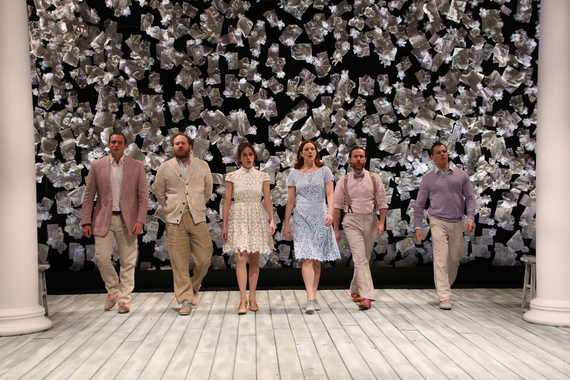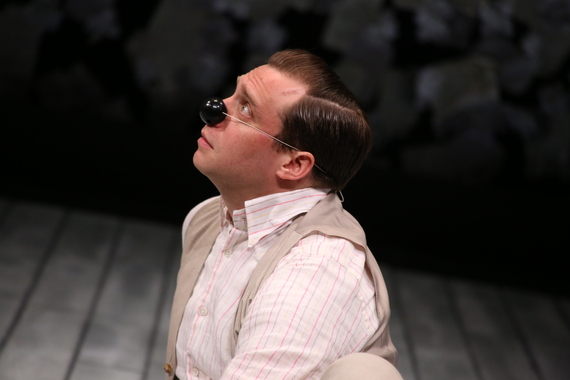"Truth hath better deeds than words to grace it."
Such is the unlikely thesis of The Two Gentlemen of Verona, penned by one of posterity's greatest playwrights to reflect on the fickleness of lust and persistence of love. William Shakespeare, a master of verse, eschews the value of his talents to contemplate the sincerity beneath them as he draws a dichotomy between feeling and folly, the former of which manifests in action, while the latter only inspires empty words. And yet, even if words are empty, they can still be filled with delight, like songbirds humming of possibility. There is perhaps no purpose, but we still beg the nightingale to croon on so as to suit our sensibility for beauty.
The Fiasco Theater's production of Two Gentlemen is just so -- light, airy, sweet. Set at the looming Polonsky Shakespeare Center, the work still seems small, but that's to allow for intimacy. And what of its folksy feel, Shakespeare for hipsters? Well it is the Theatre for A New Audience, intended to attract young Brooklynites for a night of Elizabethan entertainment. No one claims that the piece has been curated like at the Globe, to give insight into a time passed. Quite the opposite, actually: this interpretation is reminiscent of Joss Whedon's attempt at Shakespeare. It's benign, passive, and pretty, more of a spectacle for the senses than anything of great merit.
And maybe that's alright. There's no problem with aesthetics for loveliness alone, and Derek McLane's set -- like Valentine's in May -- fosters an ambiance to make the romantic swoon. The costumes have whimsy, too, what with their pastels and silhouettes that hint at the '50s. Music strummed on indie guitars adds to the charm. This trip to Verona is a vacation into wonderland, where everything is beautiful and nothing can go so terribly wrong.
Of course, nothing goes too terribly right, either. Beneath the allure of elegance lives the demon that is safety, a lack of daring that proves reckless in itself. While pushing for modernity in appearance, creative team Jessie Austrian and Ben Steinfeld forgot about modernity in reality, a world far from the 16th century. Shakespeare's text is sprinkled with misogyny and classism that you can only expect from the Bard and his era. As directors, it is Austrian and Steinfeld's responsibility to challenge antiquated concepts with their reading. They've failed, settling for senseless eye candy. Their show is a good time. It can be seen or missed without committing any great offense. In no way is it revolutionary.
That said, the actors are genuinely invested, and they deserve recognition. With a six-person cast, everyone works overtime. Austrian gives Julia a sympathetic spin, while Emily Young takes one-dimensional Sylvia and imbues her with at least some depth and wit. Zachary Fine is still growing into his role as Valentine, but his famous ode to his love at the beginning of what is normally Act III is one to watch. On the other hand, he has mastered his part as Launce's dog, Crab, with a silly smile and a few moments of repentance. Sure, he's benefitting from easy humor and cheap laughs, but it never hurts to giggle. We're all too serious, anyway.
Nevertheless, if the Theatre for A New Audience is trying to "vitalize the performance and study of Shakespeare and classic drama," as its website claims, it has fallen short with Two Gentlemen. Innovation lies in quandary, where convention is questioned and often dismissed. If this version of Shakespeare's comedy doesn't subscribe to tradition, it also doesn't reach for novelty. It's like the dawn of spring after a cold New York winter. You know it will come, and you know it will be nice. But beyond the warmth and the blooming roses, what has changed, really?

 Photo credit: Gerry Goodstein
Photo credit: Gerry Goodstein